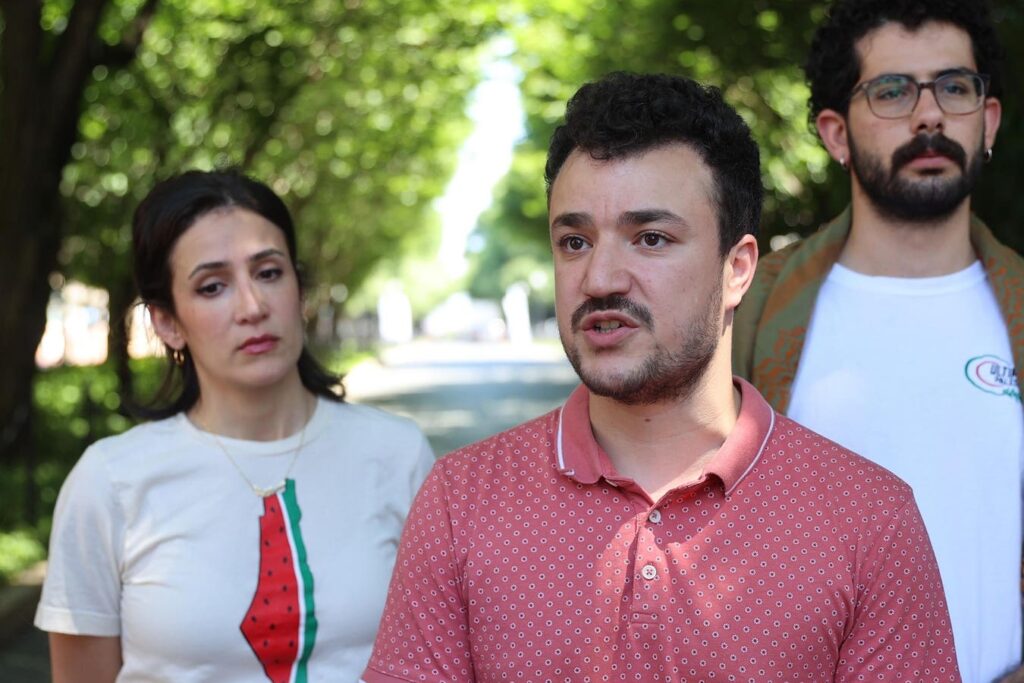Topline
A judge ruled Friday that Columbia University graduate student and legal U.S. resident Mahmoud Khalil can be deported, according to multiple outlets, issuing the ruling a little over a month after Khalil was arrested for his involvement in a pro-Palestinian protest on campus last year.
Khalil was arrested by immigration authorities last month. (Photo by Selcuk Acar/Anadolu via Getty … More
Anadolu via Getty ImagesKey Facts
Assistant Chief Immigration Judge Jamee Comans said the Trump administration can move forward with its deportation case against Khalil, giving Khalil’s attorneys until April 23 to appeal the ruling, NPR reported.
Comans made the ruling in Louisiana, at a detention center where Khalil has been held since he was detained.
Comans will order Khalil deported to Syria, his birthplace, or Algeria, where he has citizenship if Khalil’s attorneys do not file an appeal by the deadline.
Secretary of State Marco Rubio has argued Khalil can be deported over his involvement in “anti-Semitic protests and disruptive activities,” according to a memo reviewed by multiple outlets, saying keeping Khalil in the U.S. would create a “hostile environment for Jewish students in the United States.”
Comans said Friday she did not have the authority to question Rubio’s decision to deport Khalil.
Khalil’s attorneys said in a statement it will continue to seek bail for and combat the deportation of the Columbia student, adding he was “subject to a charade of due process, a flagrant violation of his right to a fair hearing, and a weaponization of immigration law to suppress dissent.”
Khalil has not been charged with a crime and the memo from Rubio did not accuse him of criminal conduct.
Crucial Quote
“If Mahmoud can be targeted in this way, simply for speaking out for Palestinians and exercising his constitutionally protected right to free speech, this can happen to anyone over any issue the Trump administration dislikes,” Khalil’s attorneys said in their statement.
What To Watch For
Khalil has a separate federal case in New Jersey to determine whether he should have been arrested and detained. He has a better chance at a more comprehensive hearing in New Jersey, The New York Times reported, noting his attorneys’ free speech and due process arguments will be heard there. So far, the judge in that case has said Khalil should remain in the U.S.
Tangent
The Trump administration has targeted several other international students in addition to Khalil, with Rubio saying last month some 300 visas were revoked from students—many of whom participated in pro-Palestinian activity, according to the BBC. Nineteen state attorneys general are asking a judge to order a stop to the visa revocations. California Attorney General Rob Bonta called the revocations “unjustified and unconstitutional” in a statement Friday.
Key Background
Khalil was arrested by plainclothes immigration officers at Columbia on March 8 and told his visa had been revoked. His attorneys later said the authorities gave Khalil no reason for the revocation of his visa. The White House justified Khalil’s arrest under the Immigration and Naturalization Act of 1952, a Cold War-era law allowing the secretary of state to mark someone as deportable if they have “reasonable ground to believe” the immigrant’s “presence or activities in the U.S. … would have potentially serious adverse foreign policy consequences for the United States.” Legal experts have said the obscure law has rarely been used in past immigration cases. Much of the Trump administration’s arguments against Khalil center around his involvement as a leader behind pro-Palestinian protests on Columbia’s campus last year, with President Donald Trump claiming he is “a Radical Foreign Pro-Hamas Student.” Khalil’s attorneys have insisted he was legally speaking out in support of Palestinian rights.
Further Reading
Can Marco Rubio Revoke Mahmoud Khalil’s Green Card? What To Know About Little-Known Law Used To Justify Protester’s Arrest (Forbes)
Mahmoud Khalil: Judge Strikes Down Trump Effort To Throw Out Case—Or Move It To More Conservative Court (Forbes)
Read the full article here


